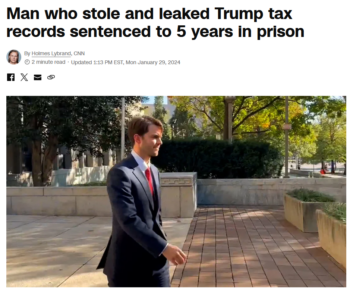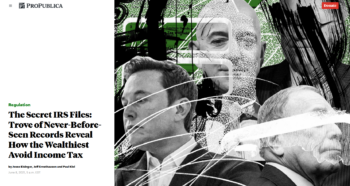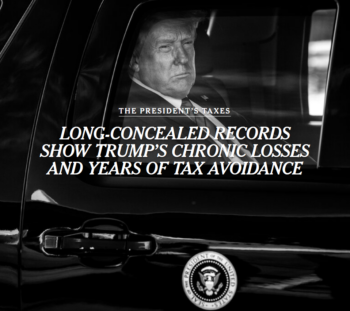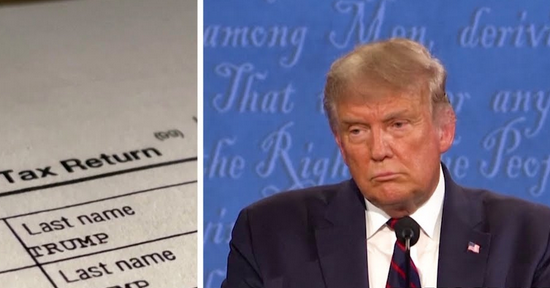By Ari Paul\ FAIR
Photos: FAIR\YouTube
Because of Charles Littlejohn, we know that former President Donald Trump and a whole bunch of other rich people pay next to nothing in taxes, while the rest of us frantically file tax returns and see our wages sucked away to fund the military, aid for Israel and corporate subsidies. Littlejohn, a former consultant at the Internal Revenue Service, leaked these tax returns, which resulted in major investigative findings for the New York Times (9/27/20) and ProPublica (6/8/21).

CNN‘s description (1/29/24) of Charles Littlejohn as someone who “stole” tax returns (he was actually convicted of “unauthorized disclosure”) is a framing that criminalizes much of what CNN and other news outlets do.
For leaking this sensitive information, Littlejohn has been sentenced to five years in federal prison, the maximum jail term (CNN, 1/29/24). Acting Assistant Attorney General Nicole Argentieri said in a statement (1/29/24):
Charles Littlejohn abused his position as a consultant at the Internal Revenue Service by disclosing thousands of Americans’ federal tax returns and other private financial information to news organizations. He violated his responsibility to safeguard the sensitive information that was entrusted to his care, and now he is a convicted felon.
Littlejohn’s lawyers (Bloomberg, 1/18/24) had argued that he had acted “out of a deep, moral belief that the American people had a right to know the information and sharing it was the only way to effect change.”
The extremity of the sentence “will chill future whistleblowers from revealing corruption and wrongdoing,” the Freedom of the Press Foundation (1/30/24) said. Slate writer Alex Sammon (Twitter, 1/29/24) said, “This guy is a hero who showed us how the super-rich steal from the American public.” Nevertheless, he added, “the judge gave him a max sentence, claiming it was ‘a moral imperative’ to punish him as harshly as possible.”
‘Basic unfairness’

ProPublica (6/8/21) said Littlejohn’s disclosure “demolishes the cornerstone myth of the American tax system: that everyone pays their fair share and the richest Americans pay the most.”
After the ProPublica investigation was released, Republicans called for investigation into how the documents were leaked, while progressives used the data to call for a reform in the tax code (ProPublica, 6/9/21). The findings gave new political life to the Occupy Wall Street movement’s central argument about wealth inequality being enforced by government policy.
Binyamin Appelbaum of the New York Times editorial board (6/8/21) wrote that there is a “basic unfairness that the wealthy are living by a different set of rules, lavishly spending money that isn’t taxed as income.” He added that the “ProPublica story underscores the argument for transparency: It allows Americans to judge how well the system is working.”
In response to the investigation, Sen. Bernie Sanders of Vermont said: “Tax the billionaires. Make them pay their fair share. Rebuild our nation’s crumbling infrastructure” (Twitter, 6/8/21). ProPublica (7/14/21) later reported the leaks reignited congressional action to tackle regressive taxation:
Elizabeth Warren (D–Mass.) and Sheldon Whitehouse (D–R.I.) wrote to the [Senate Finance] committee’s chairman, Ron Wyden (D–Ore.), that the “bombshell” and “deeply troubling” [ProPublica] report requires an investigation into “how the nation’s wealthiest individuals are using a series of legal tax loopholes to avoid paying their fair share of income taxes.” The senators also requested that the Senate hold hearings and develop legislation to address the loopholes’ “impact on the nation’s finances and ability to pay for investments in infrastructure, health care, the economy, and the environment.”
At the time of the investigation, I noted (FAIR.org, 6/17/21) that the outrage against the leaks among Republicans, the Wall Street Journal and the Financial Times was proof that the ProPublica report was something more than momentarily important.
How power works

The New York Times (9/27/20) reported that Trump’s tax returns “show that he depends more and more on making money from businesses that put him in potential and often direct conflict of interest with his job as president.”
For many of Trump’s critics, reporting on his tax returns was vital because he had failed to disclose them himself, which candidates traditionally do, and because people deserve to know how their elected leaders obtained their wealth. For Trump’s political supporters, the disclosure was meant to sully his image as a business genius and a champion of Middle America, thus empowering the Democrats’ 2020 election chances. Trump himself tried to dismiss the Times‘ revelations, saying “he paid ‘millions of dollars’” to the IRS, and that he is “‘entitled’ to tax credits ‘like everyone else’” (Fox News, 9/28/20).
Littlejohn now joins people like Reality Winner (New York Times, 8/23/18) and Chelsea Manning (NPR, 1/17/17), security and military-sector leakers who put their freedom on the line to disclose government secrets they felt should be a matter of the public record.
The fact of the matter is that investigative journalism can only happen because of leakers who take great risks. Adrian Schoolcraft, an NYPD officer who provided the Village Voice (5/4/10) with evidence of statistics manipulation, felt the wrath of government power when he was eventually forced into a psychiatric ward (Chief, 10/5/15). Edward Snowden, who provided the Guardian (6/11/13) with details about widespread NSA surveillance, is still in exile in Russia as a result of his decision to be a whistleblower.
Reporters are constantly cultivating relationships with congressional staffers and corporate executives, hoping to learn something about how power works. The infliction of the maximum penalty—Littlejohn pleaded guilty and asked for leniency—shows that the US justice system has no patience for this kind of democratic openness.






